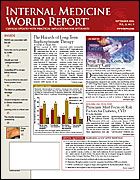Publication
Article
Physician–Patient Miscommunication Breeds Confusion about Drug Resistance
Author(s):
From the American Academy of HIV Medicine
WASHINGTON, DC?It is estimated that 76% of HIV-infected patients in the United States who do not respond to treatment have a virus that is resistant to at least 1 anti-HIV medication. Although most physicians are concerned about drug resistance, only about half of patients living with HIV/AIDS share their concerns, according to a recent survey conducted by the American Academy of HIV Medicine (AAHIVM).
"Here you see a disparity in number graphically?91% of physicians thought that drug resistance was a really important issue and were concerned about it; only 54% of patients considered themselves to be very concerned," said Howard Grossman, MD, executive director of the AAHIVM, at the academy-sponsored meeting, Perspectives in HIV Drug Resistance: Encouraging Dialogue to Meet a Critical Challenge in HIV Care.
It is important for primary care physicians to understand that the majority of patients consider their physician to be a chief resource for learning about drug resistance, Dr Grossman stressed.
"Patients are not clear at all under what circumstances they should be tested, and while virtually all physicians interviewed said they test all their patients for drug resistance, many patients?over 50%?say they have not or they're not sure if they've been tested," he said.
Calling the situation a failure of communication between physicians and their patients, Dr Grossman continued, "77% of patients say it's difficult to understand some of the terminology used. Our survey asked clinicians what words they used when they're talking about resistance, and then asked the patient panel if they understand those words, and there was a real disconnect. The language that's being used isn't understood, and I think that means the concept isn't understood."
Surveyed patients reported that educational materials concerning drug resistance were not always available to them, and only one fourth of physicians reported providing such materials when they were not specifically requested, according to Dr Grossman.
The 2 ways to test for HIV drug resistance are genotypic and phenotypic testing. Genotypic testing examines HIV genetic code and looks for drug resistance mutations in the viral genes. Phenotypic testing examines the behavior of the virus, measuring the ability of the virus to grow in various concentrations of antiretroviral drugs. The newly released guidelines (outlined above) recommend genotypic testing.
"When you're considering starting therapy in a patient, it's critical that patients understand that if they do not adhere to their medicine properly that they will allow their virus to develop drug resistance, so communication with patients in a language they can understand is critical," said John Baxter, MD, professor of medicine, Division of Infectious Diseases, Cooper University Hospital, UMDNJ-Robert Wood Johnson Medical School.
Dr Baxter added, "It's also important that we as providers explain to patients the consequences of having unsuppressed virus in the presence of these drugs that is just a setup for the virus developing resistance that will in turn limit patients' future drug options."
When it comes to discussing resistance test results with patients, Dr Baxter recommended showing them the actual report. "These reports are very technical. It's very important that providers actually go to the sources, go to experts, go to web-based tools to try to help them understand what these resistance tests are telling them," he stressed, "because if the information is not used properly, then it's not going to help the patients as much as it could."
The survey found that 64% of patients were interested in learning more about new treatment regimens, particularly those who said they were "extremely" or "very" concerned about drug resistance.






